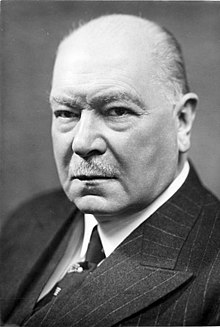was to obtain fuel products and minerals for Germany's
war effort. Herewith, Van der Holtz provides some of the
interesting details of his efforts.

One of the Germans involved in the mission was
Dr. Julius Dorpmueller, a railroad specialist who would
rehabilitate the Transcaucasia rail line and, years later,
command the Nazi government's railroads in World War
II. Nevertheless, Dorpmueller was kept on by the Allied
Powers after the war because his expertise was needed
for Germany's post-war recovery.//
julius dorpmueller click here for his biography.
----------------------------------------------------------------------------
Since we could not extend the War for much longer without these
precious things, Transcaucasia, where they were plentiful, was like a
godsend for us. So we had to extract these treasures from there and
transport them back to Germany. To do this we had to send troops and
engineers to this land of rich mines and oil that flowed from the
ground like milk and honey.
This was the reason that the Foreign Ministry and the General Staff
agreed to the Tbilisi government's request. In consequence, a pact was
made with Georgia whereby Germany would protect that nation's
external and domestic security interests with our armed forces in
exchange for Georgia's natural resources, to be used as war material.
In order to accomplish this, the detachment under my command was
deemed sufficient. I and my detachment were subordinate to Germany's
special political representative to the governments of Transcaucasia,
General Freiherr Kress von Kressenstein. Initially, the Turks attacked
the Georgians but my puny detachment proved to be enough to nip
the assault in the bud and establish calm and order.
With the expertise of Dr. Julius Dorpmüeller, who is today (1928) the
head of Germany's railways, the Poti-Tbilisi rail line was put back in
operating order and work began at the Chiatura mines. Nevertheless,
Baku, the most important prize, remained out of reach for us because
some strange things happened. This oil center was taken by the
Azerbaijan government and made its capital. Meanwhile, influential
Armenians in the Baku area established a Bolshevik republic that
encompassed the gas fields surrounding Baku, with a population of
about half a million people.

This republic's government accepted the protection of England and
succeeded in establishing itself by wiping out about 12,000 Tatars.
For quite some time the English had been focusing on the Apsheron
peninsula and its rich gas fields and they came to Baku via Iran with
troops, weapons, planes and a few tanks to take complete control of
the industrial area.
However, just at this time, the Ottoman Army of Islam put Baku under
siege and began approaching across the desert toward the city. The
Ottomans' first attack was repulsed. In the event that Nuri Paşa's
efforts were unsuccessful in seizing Baku then the goals of our own
Transcaucasia expedition would be incomplete. Consequently, the
German General Staff felt the need to send a reinforcing detachment
to the Caucasus.
In early September, a Bavarian cavalry brigade and the 16th Infantry
Division arrived at Poti, with the sole aim of seizing Baku. Surely,
this deployment weakened German fighting forces on our main battle
fronts, yet we had no choice but to pay this price in order to secure
the means for our submarines, airplanes, automobiles and railroads
to operate. However, events proved that we were really quite unsure
about our chances for success because when, on 14 September, the
Army of Islam took Baku with its second attack, the English fled in
their ships and the German troops that had just arrived at Poti were
quickly boarded onto ships and redirected toward the Balkan front.
At the beginning of October, I was sent with a small detachment and
some economic specialists to Baku to obtain oil products for Germany,
to include 20 different kinds of materials such as oil, benzine, liquid
stimulant and fuel oil. It would take too long to go into the subsequent
difficulties I faced, except to say that I struck a deal to give them
weapons and ammunition, which we would be able to provide from
the plentiful stocks we had seized in Sivastopol and Nikolayev, in
Crimea and Ukraine, respectively.
//END of PART III//
(

Hiç yorum yok:
Yorum Gönder